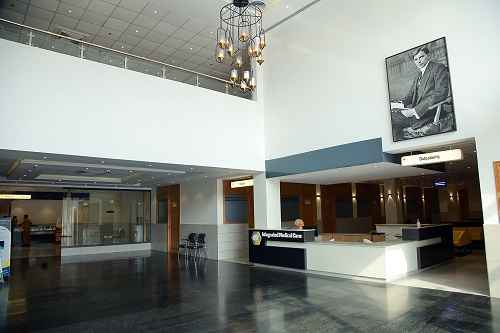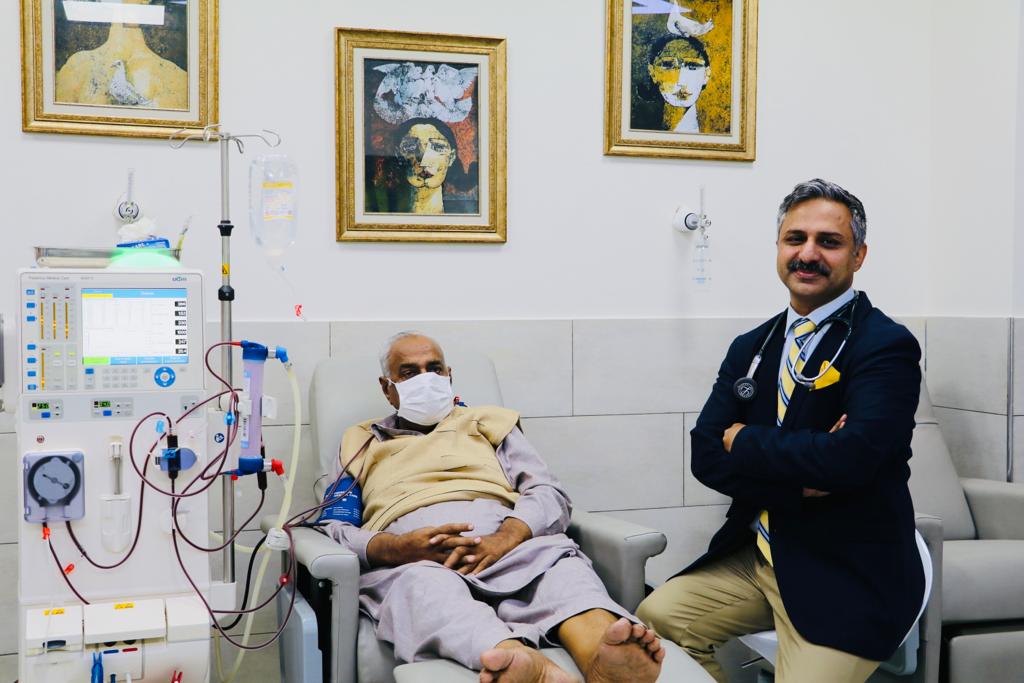- 26-Oct-22
When the kidneys cease functioning properly, a treatment called dialysis is used to eliminate waste and extra fluid from the blood. Blood is frequently diverted to a machine to be cleansed in this process.
What is Dialysis?
Dialysis is a treatment for people whose kidneys are failing. Hemodialysis and peritoneal dialysis are the two types of dialysis that carry out regular kidney functions by removing waste and extra fluid from the circulation.
Dialysis Meaning in Urdu:
ڈائیلاسز ایک خاص مشین کی طرح ہے جو ان لوگوں کے خون کو صاف کرنے میں مدد کرتی ہے جن کے گردے ٹھیک کام نہیں کر رہے ہیں۔ عام طور پر، ہمارے گردے خون کو صاف کرتے ہیں، لیکن کچھ لوگوں کے لیے، انہیں اپنے خون سے فضلہ نکالنے کے لیے مدد کی ضرورت ہوتی ہے۔ ان لوگوں کو کھانے پینے کے بارے میں محتاط رہنے کی ضرورت ہے تاکہ ان کا جسم متوازن رہے اور انہیں اکثر ڈائیلاسز کی ضرورت نہ پڑے۔
Who needs dialysis?
Dialysis may be required for people with end-stage renal disease (ESRD) or kidney failure. Kidney injury can result from accidents and diseases like diabetes, lupus, high blood pressure, and others. Kidney issues can appear in certain persons for unknown reasons. Kidney failure can develop gradually over time or quickly (acutely) as a result of a serious illness or accident. As you heal, this kind of renal failure might go away.
Kidney disease progresses via five stages. End-stage renal disease (ESRD) or kidney failure is what medical professionals refer to as stage 5 kidney disease. The kidneys are currently performing 10% to 15% of their usual duties. To stay alive, you might require dialysis or a kidney transplant. While awaiting a transplant, some people go through dialysis.
What happens during dialysis?
Hemodialysis and peritoneal dialysis are the two basic forms of dialysis.
Haemodialysis - The most popular and widely recognized form of dialysis is hemodialysis. A tube is connected to a needle during the procedure in your arm.
Blood travels through the tube and is then filtered outside of the body before returning through a different tube to the arm.
This is often done at dialysis facilities three days a week, for around four hours each session. You might also do it at home. A home dialysis schedule might look something like this:
- 4 times a week for 4 hours.
-
4 times a week for 4 hours.
-
5 times a week for 3 hours
-
6 days a week for 8 hours overnight
Peritoneal dialysis - The peritoneum, the inside lining of your belly, serves as the filter in peritoneal dialysis instead of a machine. The peritoneum functions as a filter by having hundreds of microscopic blood vessels, similar to the kidneys.
A cut (incision) is made close to your belly button before treatment begins and a catheter is placed through the cut and into the abdomen's interior region (the peritoneal cavity). This remains in place indefinitely. Through the catheter, fluid is pushed into the peritoneal cavity. Waste materials and extra fluid are taken out of the blood and into the dialysis fluid as blood flows through the blood vessels lining the peritoneal cavity. A few hours later, the spent fluid is emptied into a bag, and new fluid is added in its place. Changing the fluid typically requires between 30 and 40 minutes and should be done four times daily. If you'd like, a machine could take care of this while you sleep at night.
Which type of Dialysis is Best?
You may have a lot of control over the location and type of dialysis you receive. For the majority of users, both methods are equally effective but each has advantages and disadvantages of their own.
Example: Home hemodialysis - you'll typically need to have dialysis sessions more frequently than you would in a clinic but you can choose a treatment plan that meets your medical needs and fits around your life. Hemodialysis means you'll have 4 treatment-free days a week, but the treatment sessions last longer and you may need to visit the hospital each time. Peritoneal dialysis is fairly simple to perform at home and occasionally while you sleep but it must be done each day.
If you are given the option to select the type of dialysis you get, your care team will go over the advantages and disadvantages of each choice with you to aid in your decision-making.
Life on dialysis:
Many dialysis patients enjoy a decent quality of life. If everything else is okay, you should be able to:
-
Continue working or studying.
-
Drive.
-
Exercise.
-
Go swimming.
-
Go on holiday.
Despite the fact that dialysis can only partially restore kidney function, the majority of patients can continue receiving it for many years. When the kidneys are not functioning properly, the body is put under a lot of stress.
This means that the person, especially the elderly and those with other health issues who do not receive a kidney transplant risk dying while receiving dialysis. Adults under the age of 75 may only survive for two to three years after starting dialysis whereas those starting in their late 20s can anticipate living for up to 20 years or more. However, dialysis patients' survival rates have increased over the previous ten years and this trend is anticipated to continue.
Best Dialysis Center in Lahore:
IMC Hospital is one of the most prestigious institutions in Pakistan which is known for its performance and outstanding results regarding Nephrology and dialysis. The IMC dialysis department is a state-of-the-art patient-friendly facility that provides lifesaving care for the patients. IMC’s health systems work together to provide easier access to patient care and to help improve the quality of life of patients using innovative services. The IMC Dialysis Center is well-equipped, including a luxury dialysis patient chair that helps the patients go through the dialysis process with ease and comfort.
Dialysis Cost in Lahore:
IMC Hospital is the Best Hospital in Pakistan and has good services at the best price. Get in touch with Integrated Medical Care Hospital (IMC Hospital) to schedule a consultation. Here you find one of the best Nephrology (Kidney Diseases) specialists in Lahore Pakistan.
Prof. Dr. Shafiq Cheema
MD, MBBS, Diplomate American Board of Internal Medicine (DABIM), DABN, FACP, FASN.
Specialties - Internal Medicine, Nephrology (Kidney Diseases).
Areas Of Focus - Kidney Diseases, Hypertension, Kidney Transplantation, Dialysis, Kidney Stones, Proteinuria, Hematuria and Diabetes.
Introduction - "Professor Dr. Shafiq Cheema is a Diplomate of the American Board of Internal Medicine and Nephrology as well as a Fellow of the American College of Physicians and American Society of Nephrology. Currently, he is appointed as Professor of Nephrology at AIMC-Jinnah Hospital. He is amongst America’s top Nephrologists and the world's leading physicians. He is not only the founder of Pak Kidney Foundation (PKF) and NephChat with Dr Shafiq Cheema, providing valuable awareness through YouTube videos related to different diseases, but also the former Medical Director of FMC North America, USA."

 Map
Map










